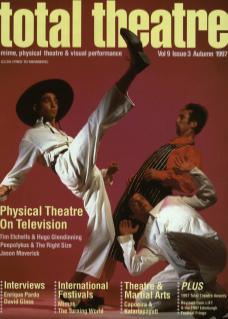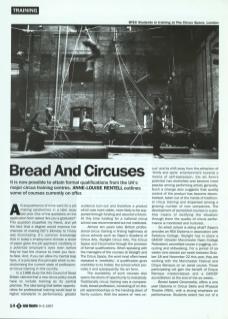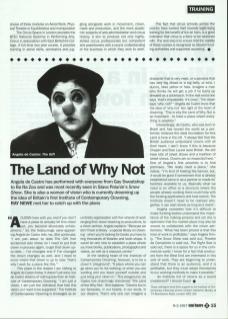An acquaintance of mine went for a job making sandwiches in a takeaway last year. One of the questions on the application form asked 'Are you a graduate?' This question stupefied my friend, and yet the fact that a degree would improve her chances of making BLTs Monday to Friday was illuminating. It's common knowledge that in today's employment climate a sheet of paper gives the job applicant credibility in a potential employer's eyes even before they've had the chance to meet you face-to-face. And, if you can allow my mental leap here, it is precisely this principle which is revolutionising the current state of professional circus training in this country.
In a 1988 study the Arts Council of Great Britain claimed that a new circus policy would have to include training as its central premise. The idea being that better opportunities for professional training would lead to higher standards in performance, greater audience turn-out and therefore a product which was more viable, more likely to be supported through funding and assured a future. At this time funding for a national circus school was recommended but not instituted.
Almost ten years later British professional circus training is finding legitimacy at circus schools such as Zippos Academy of Circus Arts, Skylight Circus Arts, The Circus Space and Circomedia through the provision of formal qualifications. When speaking with the managers of the courses at Skylight and The Circus Space, the word most often heard repeated is 'credibility'. A qualification gives credibility to its holder, the school which provides it and subsequently the artform.
The availability of such courses also opens the doors of opportunity to everybody. Traditionally circus training was a comparatively closed profession, consisting of on-the-job apprenticeships or the handing down of family custom. With the advent of 'new circus' and its shift away from the attraction of 'thrills and spills' entertainment towards a means of self-expression, the artform's potential has diversified and become more popular among performing artists generally. Such a change also suggests that quality control of the product has become decentralised, taken out of the hands of traditional circus training and dispersed among a growing number of new companies. The development of accredited courses is a positive means of rectifying the situation; through them the quality of circus performance is monitored and nurtured.
So which school is doing what? Zippos provides an RSA Diploma in association with Salisbury College. Skylight has in place a GMCOF (Greater Manchester Open College Federation) accredited course in juggling, unicycling and stiltwalking. For a period of six weeks (one session per week) between October 18 and November 22 this year, they are working with the Manchester Festival and Cirque Baroque on an aerial course. Those participating will gain the benefit of Cirque Baroque masterclasses and a GMCOF accreditation at the end of the six weeks.
Bristol-based Circomedia offers a one-year Diploma in Circus Skills and Physical Theatre (RSA), with a strong emphasis on performance. Students select two out of a choice of three modules on Aerial Work, Physical Theatre or Equilibristics and manipulation.
The Circus Space in London provides the BTEC National Diploma in Performing Arts, Circus in association with East Berkshire College. A full-time two-year course, it provides training in aerial skills, acrobatics and juggling alongside work in movement, clown, mask and production, and the more academic subjects of arts administration and circus history. It aims to produce not only highly skilled circus professionals but competent arts practitioners with a sound understanding of the business in which they wish to work.
The fact that circus schools across the country have worked hard towards legitimising training for the benefit of the artform is a good indication that circus is a force to be reckoned with. The next step is to ensure that the viability of these courses is recognised by relevant funding authorities and supported accordingly.


